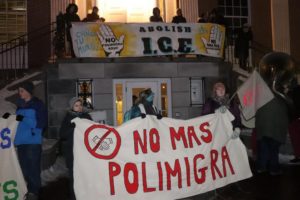A New Period for Immigrant Rights Organizing

 As immigrant workers face increasingly harsh and dangerous pandemic conditions, activists staged a car protest at Vermont’s Immigration and Customs Enforcement (ICE) data center. Draped with signs reading “Free All Detainees Now,” “Close this ICE Data Center,” and “Abolish ICE,” cars formed a half-mile honking loop in front of the center. The data center and other Homeland Security operations housed here, brought to the state by Senator Patrick Leahy (D), serves as a deportation nerve center, fielding some 1.5 million requests a year from law enforcement on people’s immigration status and accepting anonymous tips reporting undocumented workers
As immigrant workers face increasingly harsh and dangerous pandemic conditions, activists staged a car protest at Vermont’s Immigration and Customs Enforcement (ICE) data center. Draped with signs reading “Free All Detainees Now,” “Close this ICE Data Center,” and “Abolish ICE,” cars formed a half-mile honking loop in front of the center. The data center and other Homeland Security operations housed here, brought to the state by Senator Patrick Leahy (D), serves as a deportation nerve center, fielding some 1.5 million requests a year from law enforcement on people’s immigration status and accepting anonymous tips reporting undocumented workers
Demonstrations across the country have focused on the threats of Covid-19 outbreaks in jails holding detained immigrant workers, and the harsh measures taken by authorities to suppress calls for safer conditions.
Guards at the Otay Mesa Detention Center in San Diego pepper-sprayed immigrant detainee women on a hunger strike. At this writing, Otay Mesa has the largest Covid-19 outbreak at a U.S. immigrant detention center.
Protesters have targeted the Heartland Alliance youth detention facility in Chicago. The facility holds children separated from their parents at the border and 37 children have tested positive for Covid-19.
The Trump Administration has doubled down on anti-immigrant rhetoric to mask its mismanagement of the pandemic threat, placing restrictions on legal immigration based on conflating the supposed justifications of protecting public health and the jobs of U.S. workers.
The Vermont protest focused on the regional detention center in Strafford, NH, where many undocumented workers from the region have been imprisoned. Critics of the Strafford facility and the Covid-19 practice of holding immigrant detainees in solitary confinement called it a Covid “tinder box.” Speakers at the Vermont protest, in a rally held in a nearby Home Depot parking lot, called for the immediate release of everyone from the Strafford and other detention centers.
Thelma, an organizer with Migrant Justice, a farm worker labor rights group, described the long struggle against the U.S. deportation regime and the dire pandemic conditions in many detention centers. “ICE has been destroying our lives for too long. Covid-19 should not be a death sentence. We have to free all of our people who are suffering…[especially] in a situation that puts their lives in danger from the virus.”
The protest was organized by Community Voices for Immigrant Rights (CVIR), a Vermont coalition dedicated to immigrant justice, and now turning toward specifically pandemic demands. The group is also calling for the extension of emergency relief benefits to all essential workers, regardless of immigration status.
Rosi, a Migrant Justice organizer in Vermont’s dairy industry, condemned the aggressive detentions and deportations targeting farm workers and immigrant community leaders. “We are essential now, but before we were not recognized. We are not going to stop struggling until all of our rights are met.”
The pandemic has highlighted the gross injustices of capitalism’s two-tier labor system. Undocumented workers are central to key essential services, from agricultural field work, dairy and food processing to food delivery in cities like NYC, where undocumented workers comprise the majority of food delivery workers. The pandemic combined with especially oppressive employment situations makes these jobs among the most hazardous. On the other hand, in the wake of pandemic shutdowns, carried out for the benefit of public health and designed to minimize the economic costs to business, undocumented workers are not eligible for federal and state relief payments. The life-producing activities that are required to feed and reproduce workers and society are disproportionately carried out by immigrant and undocumented labor. It is more clear now why these jobs are essential and how capitalism undervalues them.
The Background of this Resistance
The key group driving several years of immigrant labor organizing in the New England region is Migrant Justice. Migrant Justice was formed in 2009 after a dairy farm worker was killed in an avoidable machinery accident on the job. Migrant workers and allies formed a coalition to fight for equal access to human rights for Vermont’s dairy farmworkers. This grassroots organization has succeeded in multiple campaigns, including ensuring access to driver’s licenses, getting undocumented workers included in healthcare legislation, and securing the release of several community members from ICE detention.
One of Migrant Justice’s most important initiatives has been the Milk with Dignity campaign, which demands that dairy corporations commit to sourcing from farms that comply with a farmworker-authored code of conduct and pay a premium that goes directly toward ethical treatment of farmworkers. Ben and Jerry’s signed onto a Milk with Dignity agreement with Migrant Justice in 2017. This has markedly improved housing and wage conditions for dairy farm workers who produce milk used by the famous ice cream company. Migrant Justice is now asking Hannaford supermarket, a huge consumer of New England dairy products, to do the same.
This campaign is part of the nationwide Worker-driven Social Responsibility (WSR) network, based on the belief that rights should be defined by the workers within global supply chains. Corporations and stakeholders have repeatedly failed to protect the vulnerable. Through initiatives such as the Fair Food Program, supply chain workers are working together from the ground up to demand their human rights.
Community Voices for Immigrant Rights (CVIR) formed in the early summer of 2019, when a group of Vermont activists were motivated to take action after observing the escalation of attacks on immigrant rights in the country. They had followed the news of concentration camps, holding children in cages, and various attempts by the Trump administration to stymie the asylum process. In July, CVIR organized a 750-person protest against the ICE data center in Williston.
Since then, CVIR has worked to support Migrant Justice on various actions including their No Más Polimigra campaign. While Migrant Justice worked in 2014 to set in place Vermont’s Fair and Impartial Policing Policy, indicating that police were not to collaborate with immigration agents (i.e. ICE and Border Patrol), the inclusion of loopholes at the eleventh hour weakened that policy.
The No Más Polimigra (No More Collaboration between Police and Immigration Agents) campaign is organizing campaigns at the municipal level to close those loopholes, building momentum for a state-level policy shift. CVIR created materials in order to better educate the public on the issue, while Migrant Justice presented their campaign around the state. Volunteers are trained on how to open the conversation within their towns. In the city of Burlington, both migrant workers and allies bravely testified in front of the City Council, demanding that a new, safer Fair and Impartial Policing ordinance be passed. The City Council passed the resolution over police objections.
Limiting means for local police to communicate with immigration agents is a huge aspect of being a city or state that can declare itself a sanctuary for immigrants. California, Oregon, Washington, and New Jersey are among states with strong sanctuary laws on the books. Vermont organizers are working to make sure that Vermont will have some of the strongest anti-collaboration laws in the country. Other states must also do their part, at the grassroots and legislative levels, to ensure that their laws do not allow for the continued terrorization of our immigrant neighbors. As it is, immigrants face a dangerous patchwork of unequal laws across state and county lines.
Looking Forward
May 1st is International Workers’ Day, also known as May Day. Migrant Justice and CVIR have joined other immigrant rights groups and unions in protests and job actions across the country. In Vermont, a May Day car rally was called recognizing essential workers for keeping us afloat and supporting demands for universal pandemic relief and safety. While undocumented immigrants work in positions deemed essential, they have not received government stimulus checks.
May Day originated from the fight of largely immigrant workers for the 8-hour day. As the international workers’ holiday, May Day in the pandemic era takes on new and heightened significance. The coronavirus and the ensuing health and economic crisis flowed quickly out of Wuhan, China following global capitalism’s supply chains, and has rapidly spread to the entire planet. In the United States, rulers have utterly failed to manage the emergency. Workers of all nationalities and immigration statuses must stand united against the nationalist divisions our rulers are eager to promote.
Through campaigns such as Milk with Dignity or No Más Polimigra, regular people can continue the fight against rightwing nationalists of the Trump Administration and the seeds of fascism in the United States. For every person who would perpetuate the modern-day forms of slavery and the Fugitive Slave Act, there are many more who would work to end them. When everyday people come together to demand better, that is where change is born.